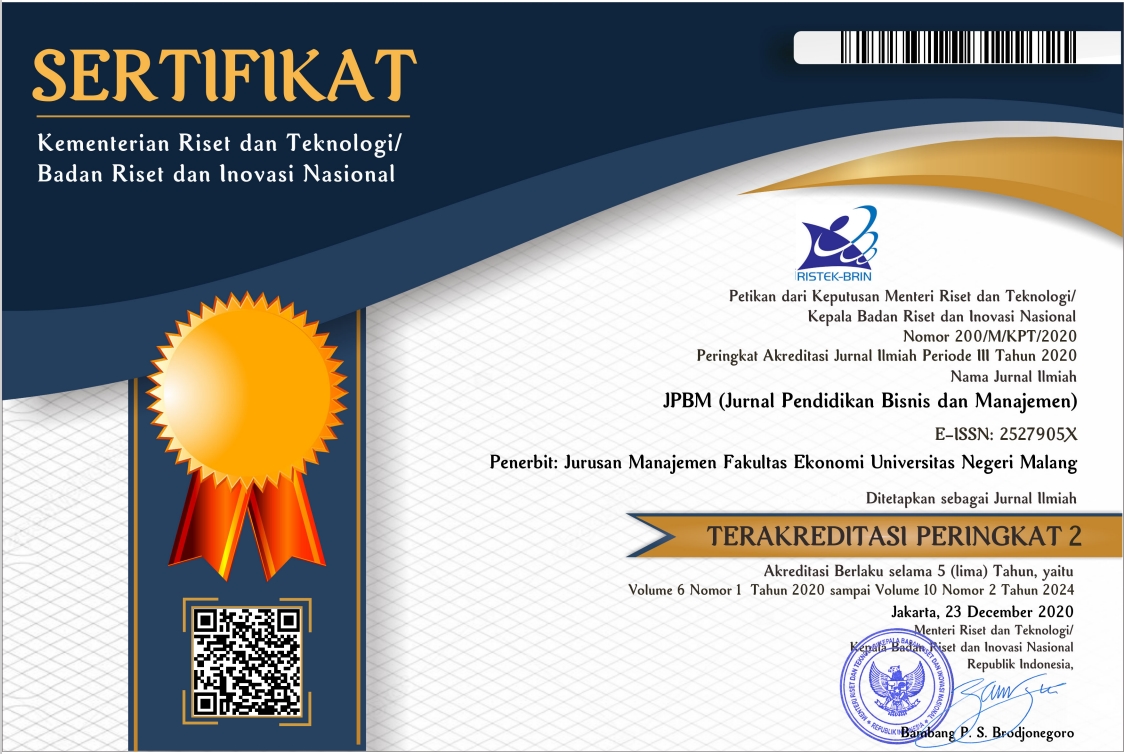Does the Role of Supervisors Determine Doctoral Students’ Success?
Abstract
The purpose of this study was to analyse the effect of the role of supervisor and procrastination on the success of doctoral studies. The sample of this research was 149 alumni of the doctoral program in Indonesia who are taken randomly. A causal study using SEM PLS was implemented with Multi Group analysis (MGA) based on work groups between lecturers and non-lecturer employees. The results of this study indicated that the role of supervisor has a positive effect on the success of the study both as a whole and per group. The role of supervisor has a positive and significant effect on overall procrastination, but differs within the group, for lecturers it is not significant while for non-lecturers is significant. Procrastination as a whole sample has no significant effect on the success of doctoral study, as well as within the group. This can be concluded that the supervisor's role plays an important role in increasing the success of doctoral students' studies.
Keywords: Success of study, role of supervisor, Procrastination.
Keywords
Full Text:
PDFReferences
Ackerman, D. S., & Gross, B. L. (2005). My instructor made me do it: Task characteristics of procrastination. Journal of Marketing Education, 27(1), 5–13. https://doi.org/10.1177/0273475304273842
Andriopoulou, P., & Prowse, A. (2020). Towards an effective supervisory relationship in research degree supervision: insights from attachment theory.’ Teaching in Higher Education, 25(5), 648–661. https://doi.org/10.1080/13562517.2020.1731449
Baulke, L., Eckerlein, N., & Dresel, M. (2018). Interrelations between motivational regulation, procrastination and college dropout intentions. Unterrichtswissenschaft, 46(4), 461–479. https://doi.org/10.1007/s42010-018-0029-5
Belavy, D. L., Owen, P. J., & Livingston, P. M. (2020). Do successful PhD outcomes reflect the research environment rather than academic ability? PLoS ONE, 15(8 August 2020), 1–14. https://doi.org/10.1371/journal.pone.0236327
Bui, H. T. M. (2014). Student–supervisor expectations in the doctoral supervision process for business and management students. Business and Management Education in HE, 1(1), 12–27. https://doi.org/10.11120/bmhe.2014.00006
Castello, M., Pardo, M., Sala-Bubaré, A., & Suñe-Soler, N. (2017). Why do students consider dropping out of doctoral degrees? Institutional and personal factors. Higher Education, 74(6), 1053-1068.
Chin, W. W. (2010). Handbook of partial least squares. In Handbook of Partial Least Squares. https://doi.org/10.1007/978-3-540-32827-8
Ferrari J. R., & Johnson J. L. M. W. G. (2015). Procrastination research a synopsis of existing. The Springer Series in Social Clinical Psychology, 2, 21–46.
Fillery-Travis, A., Maguire, K., Pizzolatti, N., Robinson, L., Lowley, A., Stel, N., … Sprerotti, F. (2017). Insights from practice: A handbook for supervisors of modern doctorate candidates. Super Prof Doc.
Ganem, N. M., & Manasse, M. (2014). The Relationship between scholarships and student success: An Art and Design Case Study. Education Research International, 2011, 1–8. https://doi.org/10.1155/2011/743120
Grunschel, C., Schwinger, M., Steinmayr, R., & Fries, S. (2016). Effects of using motivational regulation strategies on students’ academic procrastination, academic performance, and well-being. Learning and Individual Differences, 49, 162–170. https://doi.org/10.1016/j.lindif.2016.06.008
Hair, J. F., Hult, G. T. M., Ringle, C. M., Sarstedt, M., & Thiele, K. O. (2017). Mirror, mirror on the wall: a comparative evaluation of composite-based structural equation modeling methods. Journal of the Academy of Marketing Science, 45(5), 616–632. https://doi.org/10.1007/s11747-017-0517-x
Henseler, J., Hubona, G., & Ray, P. A. (2016). Using PLS path modeling in new technology research: Updated guidelines. Industrial Management and Data Systems, 116(1), 2–20. https://doi.org/10.1108/IMDS-09-2015-0382
Hill, C. W. L., & Jones, G. R. (2012). Strategic management cases: an integrated approach. Cengage Learning.
Horta, H., Birolini, S., Cattaneo, M., Shen, W., & Paleari, S. (2021). Research network propagation: The impact of PhD students’ temporary international mobility. Quantitative Science Studies, 2(1), 129–154. https://doi.org/10.1162/qss_a_00096
Ives, G., & Rowley, G. (2005). Supervisor selection or allocation and continuity of supervision: Ph.D. students’ progress and outcomes. Studies in Higher Education, 30(5), 535–555. https://doi.org/10.1080/03075070500249161
Kim, K. R., & Seo, E. H. (2015). The relationship between procrastination and academic performance: A meta-analysis. Personality and Individual Differences, 82, 26–33. https://doi.org/10.1016/j.paid.2015.02.038
Klingsieck, K. B. (2013). Procrastination in Different Life-Domains: Is Procrastination Domain Specific? Current Psychology, 32(2), 175–185. https://doi.org/10.1007/s12144-013-9171-8
Lay, C. H., & Schouwenburg, H. C. (1993). Trait procrastination, time management. Journal of social Behavior and personality, 8(4), 647-662.
Lee, A., & McKenzie, J. (2011). Evaluating doctoral supervision: Tensions in eliciting students’ perspectives. Innovations in Education and Teaching International, 48(1), 69–78.
Lee, A. (2008). How are doctoral students supervised? Concepts of doctoral research supervision. Studies in Higher Education, 33(3), 267–281. https://doi.org/10.1080/03075070802049202
Müller, R. (2019). Re-disciplining academic careers? Interdisciplinary practice and career development in a Swedish Environmental Sciences Research Center. Minerva, 57(4), 479–499. https://doi.org/10.1007/s11024-019-09373-6
Nugraha, S. I. (2014). Thematic structures in students’research papers and oral presentations: A case study of Postgraduate Program in English Education at UPI Bandung (Doctoral dissertation, Universitas Pendidikan Indonesia).
Onwuegbuzie, A. J., & Jiao, Q. G. (2000). I’ll go to the library later: The relationship between academic procrastination and library anxiety. College and Research Libraries, 61(1), 45–54. https://doi.org/10.5860/crl.61.1.45
Pearson, M., & Brew, A. (2010). Studies in Higher Education Supervision Development Research Training and Supervision Development. Higher Education, (November 2011), 37–41. https://doi.org/10.1080/0307507022011
Putra, A. A. M. T. A. S., & Rustika, I. M. (2019). Peran kontrol diri dan pola asuh autoritatif terhadap prokrastinasi akademik mahasiswa Program Studi Pendidikan Dokter Fakultas Kedokteran Universitas Udayana. Jurnal Psikologi Udayana, 6(02), 249. https://doi.org/10.24843/jpu.2019.v06.i02.p04
Simpson, W. K., & Pychyl, T. A. (2009). In search of the arousal procrastinator: Investigating the relation between procrastination, arousal-based personality traits and beliefs about procrastination motivations. Personality and Individual Differences, 47(8), 906–911. https://doi.org/10.1016/j.paid.2009.07.013
Solomon, L. J., & Rothblum, E. D. (1984). Academic procrastination: Frequency and cognitive-behavioral correlates. Journal of Counseling Psychology, 31(4), 503–509. https://doi.org/10.1037//0022-0167.31.4.503
Spronken-Smith, R., Cameron, C., & Quigg, R. (2018). Factors contributing to high PhD completion rates: a case study in a research-intensive university in New Zealand. Assessment and Evaluation in Higher Education, 43(1), 94–109. https://doi.org/10.1080/02602938.2017.1298717
Steel, P. (2007). The nature of procrastination: A meta-analytic and theoretical review of quintessential self-regulatory failure. Psychological Bulletin, 133(1), 65–94. https://doi.org/10.1037/0033-2909.133.1.65
Svartdal, F., Dahl, T. I., Gamst-Klaussen, T., Koppenborg, M., & Klingsieck, K. B. (2020). How study environments foster academic procrastination: Overview and recommendations. Frontiers in Psychology, 11. https://doi.org/10.3389/fpsyg.2020.540910
van de Schoot, R., Yerkes, M. A., Mouw, J. M., & Sonneveld, H. (2013). What took them so long? Explaining PhD Delays among Doctoral Candidates. PLoS ONE, 8(7). https://doi.org/10.1371/journal.pone.0068839
van Rooij, E., Fokkens-Bruinsma, M., & Jansen, E. (2021). Factors that influence PhD candidates’ success: the importance of PhD project characteristics. Studies in Continuing Education, 43(1), 48–67. https://doi.org/10.1080/0158037X.2019.1652158
Wirajaya, M. M., Padmadewi, N. N., & Ramendra, D. P. (2020). Investigating the Academic Procrastination of Efl Students. Jurnal Pendidikan Bahasa Inggris Indonesia, 8(2), 67–77.
Wisker, G., Robinson, G., & Shacham, M. (2007). Postgraduate research success: Communities of practice involving cohorts, guardian supervisors and online communities. Innovations in Education and Teaching International, 44(3), 301–320. https://doi.org/10.1080/14703290701486720
Wollast, R., Boudrenghien, G., Van Der Linden, N., Galand, B., Roland, N., Devos, C., … Frenay, M. (2018). Who are the doctoral students who drop out? Factors associated with the rate of doctoral degree completion in universities. International Journal of Higher Education, 7(4), 143–156. https://doi.org/10.5430/ijhe.v7n4p143
Wright, T., & Cochrane, R. (2000). Factors influencing successful submission of PhD Theses. Studies in Higher Education, 25(2), 181–195. https://doi.org/10.1080/713696139
Refbacks
- There are currently no refbacks.
JPBM (Jurnal Pendidikan dan Bisnis Manajemen) is licensed under a Creative Commons Attribution-NonCommercial-ShareAlike 4.0 International License.
JPBM (Jurnal Pendidikan dan Bisnis Manajemen) is abstracted and indexed in :
















